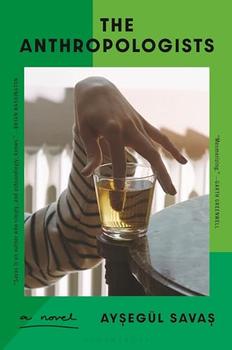Summary | Excerpt | Reviews | Beyond the Book | Read-Alikes | Genres & Themes | Author Bio

This article relates to The Anthropologists
.jpg) In Aysegül Savas's The Anthropologists, Asya, the novel's narrator, is a documentary filmmaker set to embark on a project based around the goings-on in her local park. Though not explicitly identified as such, Asya's project sounds a lot like "cinéma vérité," a style of filmmaking developed in the 1950s and '60s that aimed to capture life "as it is" by using authentic dialogue and natural action, often prioritizing ordinary people as subjects. By deliberately embracing spontaneity and eschewing carefully controlled narratives, the pioneers of cinéma vérité hoped to reveal deeper truths that could not be captured through traditional storytelling. This seems to be Asya's intent as well, since she does not have an aim with her film other than to show the ways that people live, and how they see their surroundings and themselves.
In Aysegül Savas's The Anthropologists, Asya, the novel's narrator, is a documentary filmmaker set to embark on a project based around the goings-on in her local park. Though not explicitly identified as such, Asya's project sounds a lot like "cinéma vérité," a style of filmmaking developed in the 1950s and '60s that aimed to capture life "as it is" by using authentic dialogue and natural action, often prioritizing ordinary people as subjects. By deliberately embracing spontaneity and eschewing carefully controlled narratives, the pioneers of cinéma vérité hoped to reveal deeper truths that could not be captured through traditional storytelling. This seems to be Asya's intent as well, since she does not have an aim with her film other than to show the ways that people live, and how they see their surroundings and themselves.
Cinéma vérité emerged as a response to conventional documentary filmmaking in the mid-20th century. At the time, documentaries were generally laboriously structured and contrived, relying on talking heads, re-enactments, and a disembodied narrator to manage viewers' intake of information. Avant-garde filmmakers of the era wanted to challenge this framework by creating purely observational films that did not seek to educate or inform viewers, but simply presented reality as it happened. The movement was highly influential, impacting both fiction and non-fiction film, and later, television — indeed, An American Family from 1971, widely regarded as the first reality TV series, is arguably a cinéma vérité project.
Though movements along these lines developed in multiple countries around the same time, "cinéma vérité" originated in France. Directors Jean Rouch and Edgar Morin (who together coined the term) were inspired by the work of Soviet art collective Kinoki, who under the leadership of Dziga Vertov created Kino-Pravda, a series of 23 films that featured clips of ordinary people going about their daily lives. Vertov's filmmaking philosophy, along with influences from the burgeoning French New Wave cinema movement, led Rouch and Morin to collaborate on Chronicle of a Summer, the definitive cinéma vérité project. Shot in Paris, the film is predominately made up of interviews with people that Morin and Rouch find on the street, who they ask to relay aspects of their lives and probe with simple, direct questions, such as "Are you happy?"
The result is a fascinating portrait of the mood in Paris at the time, in the latter years of the Algerian war for independence and before the student riots that would overtake the city at the end of the decade. By simply allowing people to speak freely, the documentarians capture raw aspects of the social and political landscape in ways that would arguably not have been possible through more conventional documentary filmmaking. In addition, the film self-consciously reflects on the nature of documentary-making itself, questioning whether it is even possible for documentaries to avoid some level of contrivance. This focus on the line between truth and fiction, and the drive to eradicate any deceptions that might blur it, is another hallmark of cinéma vérité.
Though cinéma vérité is lauded as a revolutionary development in the history of cinema, it is not without its critics. Werner Herzog, for example, has been critical of the movement's ethos, claiming that its obsession with showing only "pure" reality is a doomed project. "By dint of declaration," he has said, "the so-called cinéma vérité is devoid of verité. It reaches a merely superficial truth."
It is interesting to ask whether we can gather all the truth we need merely from the things we see and what people say, or whether some aspects of humanity can only be reached through artifice. For example, is a photograph of a river at sunset more truthful than an Impressionist painting of the same subject? In some ways, of course, yes, but then there are aspects of the emotional experience we might have of that river that can only be expressed in ways that are not true to life — changing the colors, altering shapes, etc. By obsessing over what we believe to be fact, we might be ignoring the more elusive aspects of human experience that can only be expressed through fiction. Whether or not Herzog's criticisms stand, however, it remains the case that cinéma vérité made an enormous contribution to the history of filmmaking, and its influence continues to reverberate in how films are made today.
French documentary filmmaker Jean Rouch
Photo (cropped from original) by Lusouser (CC BY-SA 4.0)
Filed under Music and the Arts
![]() This article relates to The Anthropologists.
It first ran in the July 17, 2024
issue of BookBrowse Recommends.
This article relates to The Anthropologists.
It first ran in the July 17, 2024
issue of BookBrowse Recommends.
Your guide toexceptional books
BookBrowse seeks out and recommends the best in contemporary fiction and nonfiction—books that not only engage and entertain but also deepen our understanding of ourselves and the world around us.